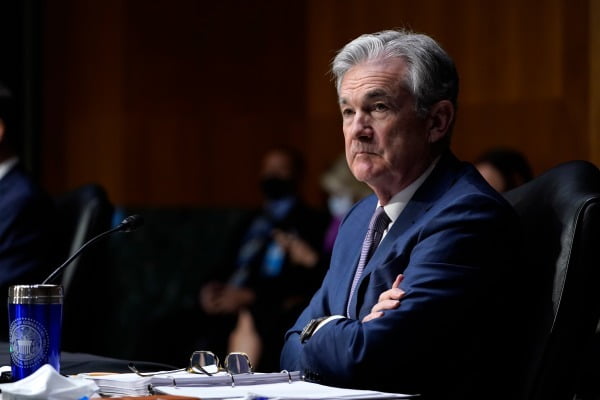
Jerome Powell Chairman of the US Central Bank (Fed). Photo = EPA
Long-term Treasury bond yields, which contributed to the plunge in the U.S. New York Stock Market, have settled somewhat in the bond market on the 23rd (local time), but there are still concerns.
The 10-year yield was 1.37% per year on this day, the same as the previous day, but for 30-year items, it rose by 0.02% to 2.21% per year. It is the highest since January 22nd last year.
It was the remarks of Fed Chairman Jerome Powell that prevented further increases in 10-year interest rates.
Powell attended the Senate Financial Committee at 10 am on the same day in a video format, explained the situation of the game for about 2 hours and 40 minutes, and conducted questions and answers with the lawmakers. Here, I poured out a’pigeon wave’ (currency easing) remark.
The outline is as follows.
-The course of the economy depends on the rate and degree of control of the coronavirus.
-The economy slowed significantly due to the re-proliferation of the corona, and the damage was concentrated on the’weak link industry’
-The economic recovery is uneven and incomplete, and the outlook is very uncertain.
-The pace of improvement is slow, with an average of 29,000 new jobs from November last year to January this year.
-The target for inflation is 2.0%, but only slightly above it will allow the long-term average to reach 2%.
-We will maintain the Fed policy (ultra-low interest rates and bond purchases) until we meet our employment and inflation targets.
In other words, the focus was on the fact that the current economy is still in a bad situation and there is no reason to withdraw the monetary easing policy. Again, the Fed’s goals are full employment (3.5-4.0% unemployment) and inflation (above 2.0%).
Despite the recent surge in oil prices, prices are showing signs of a gradual rise, but Powell said, “We have to exceed 2.0% of the long-term average.” (For reference, inflation rates in December last year and January this year were 1.4%. .)
![Powell appears again as a relief pitcher?... The House of Representatives mentions YCC [조재길의 지금 뉴욕에선]](https://i0.wp.com/img.hankyung.com/photo/202102/01.25493164.1.jpg?w=560&ssl=1)
The 10-year Treasury bond yield was on the rise again on this day, but it calmed down after Powell’s remarks, and the stock price, which had fallen for two consecutive days, has also stabilized.
In fact, Powell’s diagnosis of the game has not changed from before. It didn’t even suggest the’additional easing’ policy the market wanted. Even so, the mayor accepted Powell’s words as good news. We were already preparing for a rebound following the plunge the day before, and it may be that the Powell speech was necessary.
Some of Powell’s comments said, “We understand that our actions affect households, businesses and communities.” It sounded as a nuance that the Fed did not want the stock and real estate market to collapse.
Powell will also attend the House of Representatives at 10 am (midnight KST) on the 24th. Again, we have video-based Q&A with members of our committee.
As government bond yields have emerged as an ultra-modern concern, it is noteworthy what kind of remarks to be made.
Some believe that Powell will be able to express its opinion on YCC (Yield Curve Control). Bloomberg pointed out that “the soaring inflation rate could pressure the Fed to enforce YCC policy.”

US Fed Chair Jerome Powell speaks at a Senate hearing on the 23rd (local time). Online Hearing Capture
YCC is a non-traditional monetary policy tool that actively buys and sells government bonds so that long-term (10-30 years) interest rates do not deviate from specific targets.
For example, a government bond interest rate target is set, and if it rises above this, the authorities buy unlimited bonds and force them to drop. It can lower the loan interest burden on businesses and households caused by rising interest rates.
However, there is a disadvantage that there is a risk of loss of control due to a gap with the real economy, and pressure to increase interest rates will burst at once when YCC is stopped. It is very difficult to implement an exit strategy.
Many members of the Federal Open Markets Committee (FOMC), including Powell, said until last year that “YCC can be reviewed, but it is difficult to implement it.”
Now, an analysis says that the situation has changed somewhat. This is because international oil prices are on the rise unexpectedly, and the $1.9 trillion super stimulus package is also showing signs of stimulating prices. Last year, Powell’s remarks that “the economy is bad” was interpreted as an increase in liquidity, but now that there are not many cards to use, it is difficult to be recognized as a good news only. You need something else.
The YCC card that can ignite the rise of government bond interest rates. Could Powell use this card?
New York = Correspondent Cho Jae-gil [email protected]
